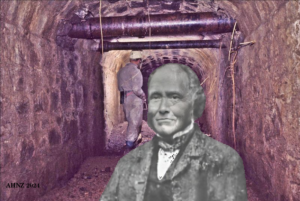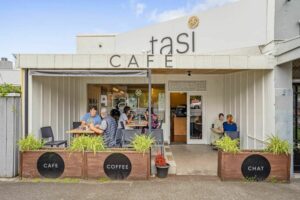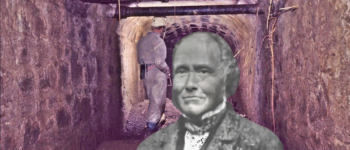1863: Harp of Erin Tunnel
January 8, 2024
By AHNZ
 John Strange built many historical landmarks of Auckland and at his death (1882) was one of the oldest colonists. They have lasted because Strange was a Master Mason and his products were of Auckland basalt. Many of these are heritage listed buildings such as his own cottage, Kinder House, and The Deanery which are all in Parnell. The Melanesian Mission at Kohimarama was also his along with several other projects for Bishop Selwyn. One of his first jobs was building the ‘old barrack wall’ which must have been a close cousin to the walls still standing at Auckland University. Mr Strange was also called upon by other famous founding fathers, William Brown and Logan Campbell, for their stonework.
John Strange built many historical landmarks of Auckland and at his death (1882) was one of the oldest colonists. They have lasted because Strange was a Master Mason and his products were of Auckland basalt. Many of these are heritage listed buildings such as his own cottage, Kinder House, and The Deanery which are all in Parnell. The Melanesian Mission at Kohimarama was also his along with several other projects for Bishop Selwyn. One of his first jobs was building the ‘old barrack wall’ which must have been a close cousin to the walls still standing at Auckland University. Mr Strange was also called upon by other famous founding fathers, William Brown and Logan Campbell, for their stonework.
Whereas plenty of Strange’s work remains and is heritage listed there is one that nobody sees now and nobody remembers either. At some point in his career Benjamin constructed a stone tunnel right under modern day Campbell Road. According to his obituary it was called Harp of Erin Road back then after the lost name of that locality where Greenlane & Ellerslie meet. This, in turn, was named after the Harp of Erin Hotel which is also lost.
The tunnel was found again in the late seventies…
“During 1977, at Campbell Road, Royal Oak, Auckland, a trench was being dug along the park side of the street during the laying of a large water main. In the process, a forgotten bluestone-lined tunnel was discovered, running diagonally under Campbell Road from the One Tree Hill side across to the Rawhiti Road side. Exploration showed that both ends had been blocked with fill. It was covered over again but it’s still there, waiting to be once more forgotten and rediscovered.” – New Zealand: History & Natural History, Facebook (2015)
The Onehunga Heritage Survey (2013) didn’t know much more about any of this than they found in the New Zealand Herald obituary for Strange. As best as they could pin it down the tunnel was built between September 1853 1882. In other words, between Strange’s arrival in New Zealand (1852) and his dying (1882.) A fairly safe estimate!
“Places of particular interest to the community were…Campbell Road basalt-lined ‘tunnel’ or cistern (yet to be fully identified). The existence of this feature came from research in to those who made the dry stone walls in Onehunga…Strange created the tunnel for Messrs Brown and Campbell, after September 1853, when the partnership purchased the One Tree Hill estate. The tunnel was erected before Strange’s death in 1882 as it was noted in his obituary.” – Onehunga Heritage Survey Report, Auckland Council (2013)
“One of the first of these contract works was the large store warehouse in O’Connell street, erected for Messrs Brown and Campbell…Another work built for the same firm, was a stonework tunnel under the Harp of Erin road.” – Death of Mr J. Benjamin Strange, NZ Herald (1882,) Papers Past
“So the butcher the late Cliff Robinson was lucky enough to have his own tunnel?” – Jeanette Audain, comment to NZH&H, Facebook (2015)
 As best I can tell the tunnel joins Cornwall Park, a farm back in Strange’s day, with what was once a butcher’s shop near Rawhiti Road. Apparently the butcher was a florist by the 2010s but as of 2024 appears to be part hairdresser, part cafe. I hope someone will tell me if I’ve got the wrong spot. There is nothing I can see on the Auckland GIS to indicate the tunnel at all.
As best I can tell the tunnel joins Cornwall Park, a farm back in Strange’s day, with what was once a butcher’s shop near Rawhiti Road. Apparently the butcher was a florist by the 2010s but as of 2024 appears to be part hairdresser, part cafe. I hope someone will tell me if I’ve got the wrong spot. There is nothing I can see on the Auckland GIS to indicate the tunnel at all.
Why did Brown and Campbell commission a tunnel under the road like this? Surely the Harp of Erin was a sleepy, bucolic, countryside back in these olden times? Crossing the road with product for a butcher shop wouldn’t exactly cause a traffic jam would it? Yet this tunnel anticipates the scores of dairy cow underpasses added to much busier New Zealand roads in the C21st century. I have 2 speculations.
Firstly, thinking as a Libertarian, any time these oddities pop up you can be fairly certain that it is a sane solution to a crazy government rule. It was probably some regulation of the county, probably Eden County, that didn’t allow a retail butcher shop on a farm. And, or, didn’t allow animals to be slaughtered at a butcher shop. If so, this would be a similar situation alcohol prohibition laws in 1914 when Corbans set up a tiny shop on the ‘lawful’ side of the boundary line yet directly adjacent to their factory. Ref. AHNZ (2023)
Secondly, maybe this road did get busy after all? In the 1860s this roading was roaring away. Great South Road, the major intersection to the north-east, was specifically constructed to send men and provisions to the front at the Waikato War. Campbell and Brown’s farm would have been in an excellent position to profit from supplying this chain of troops. It might be that a tunnel was a vital bit of infrastructure for keeping bulk meat product cool and secure before refrigeration technology came. And it may be that this road was so busy with military traffic and supporting activity that a tunnel was essential in order to get chicken, beef, mutton, etc. to the other side.
It’s due to this speculation on my part that I think the tunnel belongs to the year 1863, give or take. The time of the Waikato War. Ref. 1863: “To Make A Cullender of the Colony”, AHNZ
AHNZ has sent emails to both businesses on the site as well as the firm selling the cafe business. Hopefully I’ve got the right spot for the tunnel and someone will write back with more information. Would not be surprised if they don’t even know there’s a colonial tunnel under their feet though.
—
Image ref. NZH&H picture of tunnel with cropped and enhanced image of Strange AHNZ (2024) using image attached by Sunset to Strange’s Find A Grave page
Image ref. Tasi Cafe (2024,) is presently for sale and leases one of the buildings on the property with the tunnel. kakapobusiness.co.nz
4 thoughts on "1863: Harp of Erin Tunnel"
Leave a Reply
 Like Comment Share
Like Comment Share






I really enjoyed this article, a bit of local history, which I am sure, I and everyone else, have never heard of. Great stuff!
Thanks! I hoped you’d think so. Got any geophysical gear? Might be an idea to do a bit of Ghostbusters II and confirm the location.
The tunnel was rediscovered a few years back accidentaly by Chorus staff laying fibre optic cable. They knocked through and caused quite the stir (our friends lived in the house behind where the butcher is). They were told it was a tunnel from the farm used to transport, slaughter and butcher cattle.
1977 All over again. Wonder if it made the papers and if you remember which year?